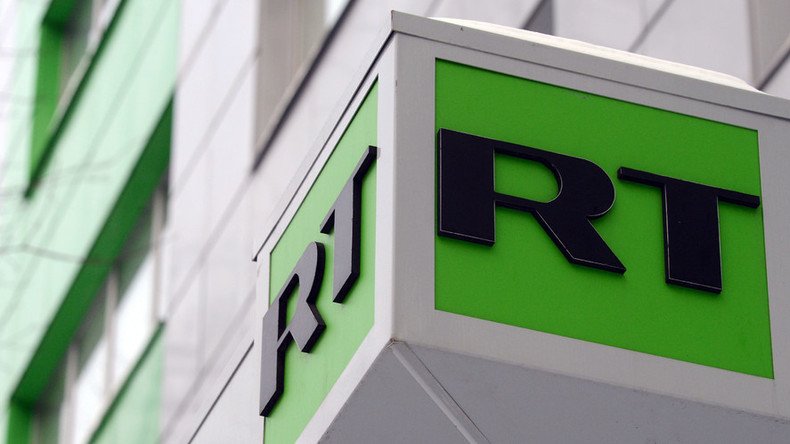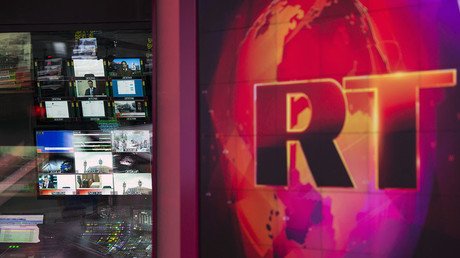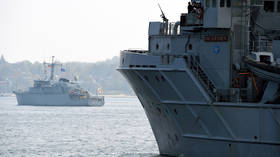Who’s airbrushing reality? The information war against RT

The propaganda war waged against media that broadcast in the West and that don’t toe the official pro-NATO line is unrelenting.
The latest salvo comes in the form of a paper entitled ‘Russia’s Information Warfare- Airbrushing reality’, authored by Ben Nimmo, a former NATO Press Officer and Dr Jonathan Eyal of the Royal United Services Institute.
The paper, submitted recently to an inquiry of the House of Commons Defence Select Committee, claims: “Russia is conducting a coordinated but undeclared information campaign against the United Kingdom, attempting to influence the UK's domestic debate on key issues in order to produce an outcome of benefit to Russia.”
Nimmo and Eyal say: “Russia's information warfare in the UK can best be thought of as an attempt to airbrush reality,” and that the “chief communicators of this airbrushed reality” are RT and Sputnik. The “Kremlin-funded” stations are accused of giving disproportionate coverage to extremist politicians, experts of dubious background, and mainstream politicians whose views chime with the Kremlin's chosen narrative.
“The most notable and frequently practiced violation is the practice of allocating disproportionate coverage to speakers who echo the Kremlin's preferred narratives on issues such as Brexit (supported by the Kremlin), Scottish independence (supported), Trident renewal (opposed) and the report on the murder of Alexander Litvinenko (opposed),” the paper says.
Nimmo and Eyal further accuse RT of giving “disproportionate coverage and air time” to UKIP, and affording the democratic socialist Jeremy Corbyn “a prominence which eclipsed the other three candidates” during last summer’s Labour Party leadership campaign.
The report displays throughout what my OpEdge colleague Bryan MacDonald has called “Russophrenia.” Russia is both a “declining power” and one we all need to be scared of. It ridicules and denigrates what it terms “Kremlin-funded” media and its “experts of dubious background.” At the same time, it tells us the same media pose a threat to European security.
The report ends with a warning: “Notwithstanding its often risible propaganda effort, Moscow has succeeded in getting across a set of messages, which may well hobble European security and which need to be urgently confronted.”
Where to begin in response?
The idea that RT and Sputnik pose a threat to ‘European security’ is so laughable that if you were reading ‘Russia’s Information Warfare’ for the first time on April 1, you’ll be forgiven for thinking it was an April Fool prank.
The threat to ‘European security’ such as it is, doesn’t come from Russia or ‘Kremlin-funded’ media, but from the West’s own disastrous neocon foreign policies and the wars of choice it waged in the Middle East. It’s not Russian agents blowing up innocent Europeans as they enter airports or sit at cafes, but members of a terrorist death cult that Russia, together with the Syrian Army, has been fighting successfully in Syria. When it comes to Islamic State (IS, formerly ISIS/ISIL), and the terror the group is bringing to Europe, we must never forget the declassified secret US intelligence document from August 2012, which declared the “possibility of establishing a declared or undeclared Salafist principality” in Syria was “exactly what the supporting powers to the opposition want, in order to isolate the Syrian regime.”
‘Russia’s Information Warfare’ purports there is a Kremlin plot to use RT and Sputnik “to influence the UK's domestic debate on key issues in order to produce an outcome of benefit to Russia.”
Well, if you’re a Western establishment conspiracy theorist you might well think that.
The main empirical dispute over Russian involvement in Syria was whether Russia hurts ISIS. #Palmyra has put that phony dispute to bed.
— Max Abrahms (@MaxAbrahms) 27 March 2016
Are we really expected to believe that Moscow pushes John Wight to come on RT to discuss Trident renewal, or that Alex Salmond chooses to appear on Going Underground at the behest of the Kremlin?
A more plausible explanation is surely that RT, as an ambitious media enterprise keen to expand its market share, has been reacting to audience demand. It has seen a gap in the market and realized that voices outside the 'extreme center', whether they’re right-wing libertarians, Scottish or Welsh nationalists, genuine leftists and socialists, Greens, or paleo-conservatives, don't get much hearing in the UK, despite the fact that these viewpoints are shared by large numbers of people.
I call RT ‘the zeitgeist channel’ because more than any other station it’s cottoned on to the fact that people across the West are fed up with long-established, discredited elites and want real, meaningful change. The phoney elite consensus, which stands for more wars and ‘liberal interventionism’, more transference of wealth to the one percent and more corporate welfare, most certainly does not reflect where majority public opinion in the West is in 2016.
In Britain, the Iraq war, and the blatant lies that were told to promote it, the bankers bailout, and the revelations of paedophile sex scandals involving prominent and protected Establishment figures, which had earlier been dismissed by media gatekeepers as “conspiracy theories,” have all contributed to a new wave of anti-elite populism.
Here’s the rub: established channels filled with cautious, elite-friendly commissioning editors who are anxious not to rock the boat too much, have taken much longer to react to this radical change in the public mood than the new kid on the block - RT.
If your preferred Syria expert tells you the Syrian and Russian militaries don't ever really target IS it's time to find a new Syria expert.
— Max Abrahms (@MaxAbrahms) 31 March 2016
So while BBC’s flagship current affairs programme Newsnight continues to wheel out discredited neocon grandees and Blairite liberal interventionists in its discussions on Syria, as if the Iraq war and the non-show of WMDs never happened (and its editors wonder why its ratings continue to fall), RT is putting forward pundits who actually exposed the conflict right from the beginning.
In fact, on important foreign policy stories, it’s been the Western broadcast media, which is invariably playing catch-up with RT.
@SkyNews Old news to those of us accessing reputable news outlets such as @RT_com Do try and keep up.https://t.co/h0Hq15rXdM
— Sean (@seanTomButt) March 25, 2016
The neocon-gatekeeper and officially approved ‘experts’ told us in 2011 and 2012 on neocon-gatekeeper, officially approved media networks that the ‘Official Enemy’, the government of President Assad, had minimal public support in Syria and would imminently fall. By contrast, it was the much-maligned “dodgy pundits” on RT who were telling us that Assad wasn’t going anywhere anytime soon and that radical jihadists and not “moderate rebels” were at the forefront of the rebellion against him. Of course, such claims were dismissed at the time as “Kremlin propaganda.” You can judge for yourself who was really “airbrushing reality.”
Why did Western think tank pundits & the media get the basic facts on Syria so wrong?
— Max Abrahms (@MaxAbrahms) 28 March 2016
It was exactly the same on Libya too: you had to tune in to RT to find pundits who would say that the NATO intervention would turn the country into a failed state and a magnet for violent jihadists, which is exactly what happened.
RT is criticized for its choice of experts and pundits, but it’s important to remember that booking people to appear on television is a two-way process. You can observe on Twitter (and its not a very edifying spectacle) how people are urged to boycott RT, by the same little gang of neocon gatekeepers who urged people to boycott Iran’s Press TV, which was taken off air in the UK in 2012.
Regarding the “prominence” given to Jeremy Corbyn, it shows how RT is the zeitgeist channel. Corbyn was THE big political news story in Britain in the summer of 2015: the 100-1 outsider who came from nowhere to run away with the Labour leadership contest. RT's coverage of the battle reflected Corbyn‘s popularity, unlike other channels that gave disproportionate airtime to his much less popular Blairite critics.
RT’s coverage of UKIP can be seen in the same light. Whatever your opinion of them, Nigel Farage’s Euroskeptic party did top the poll in the UK’s 2014 elections to the European Parliament - the first time in over 100 years that a party other than the Conservatives or Labour had done this. The Guardian, quite rightly, called it a “political earthquake,” but RT is criticized for reflecting this major shift in British politics in its coverage.
The claim that “Kremlin-funded” media is pushing Brexit because Dr Evil aka Vladimir Putin wants it, is one that has been made regularly in recent weeks by pro-EU establishment figures, but what actual evidence do we have for this assertion? Russia has officially denied that it has a position on Brexit.
Again, isn’t it more likely that RT is giving Brexiters a fair crack of the whip because around half of the British people want ‘Out’ of the EU, and their views have not always been adequately heard on other channels?
We’re being told in establishment media that we must vote to “Remain”, because Putin wants us out, but what about the US urging Britain to stay in, as the State Department believes this suits US interests? Why is this not deemed controversial and an unwarranted interference in internal UK affairs?
And even if we agree that Brexit is in Russia’s interests, why does this mean that it is not in Britain’s best interests too? After all, Russia wants to defeat IS in Syria. Does this by neocon logic mean that it’s not in Britain’s interests too?
The charges against “Kremlin-funded” media, made not only in “Russia’s Information War- Airbrushing the Reality”, but also in other publications, don’t really stand up to any serious scrutiny. It begs the question: why do they keep being made?
The problem is that the West’s endless war lobby no longer has control of the narrative. They worry that ordinary members of the public, thanks to channels such as RT and Sputnik, are being exposed to information that they really shouldn’t be seeing or hearing. Information such as the Hillary Rodham Clinton emails, which showed Google and Al-Jazeera collaborating with the US State Department in pursuance of regime change in Syria, or the discussion between the State Department’s Victoria Nuland and US Ambassador Geoffrey Pyatt over who should and shouldn’t be in Ukraine’s new ‘democratic’ government.
These very important revelations, which reveal the hidden agendas behind world events, were ignored by most major news networks - but not by RT.
It's worth noting (as Glenn Greenwald did here) just who are the “most vocal among the anti-RT crowd on the ground” and that there is a very strong overlap between these people and supporters of the Iraq war. Now, why should those who cheer led for an illegal war 13 years ago (and indeed also pushed for Western military ‘interventions’ in Libya and Syria), be so keen for the authorities to act against “Kremlin-funded media”? Is it really because said media poses a threat to European security, or is it because today they make it much harder to sell to the public “Iraq has WMDs” style pro-war propaganda? It’s hardly a three-pipe problem, is it?
The idea that RT’s neocon critics are concerned about ‘truth’ and ‘media impartiality’ is surely the funniest thing since the ‘Cheeky Monkey’ sketch on the Alan Partridge Show. If we had had ‘truth’ and ‘media impartiality’ in 2003, and had the neocon ideologues been properly challenged about their false WMD claims, then we wouldn’t have had the Iraq war.
The great crime of RT for Western foreign policy hawks is not that it “airbrushes reality,” but that it doesn’t. And that explains why RT and its contributors are under constant attack from the Imperial Truth Enforcers.
The statements, views and opinions expressed in this column are solely those of the author and do not necessarily represent those of RT.














